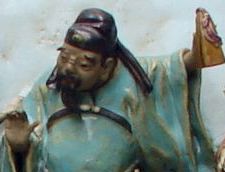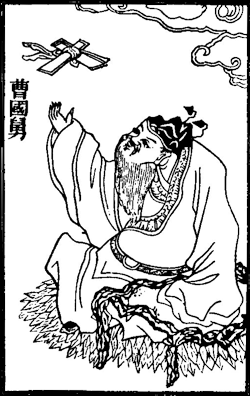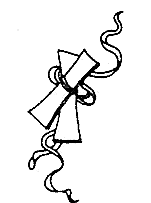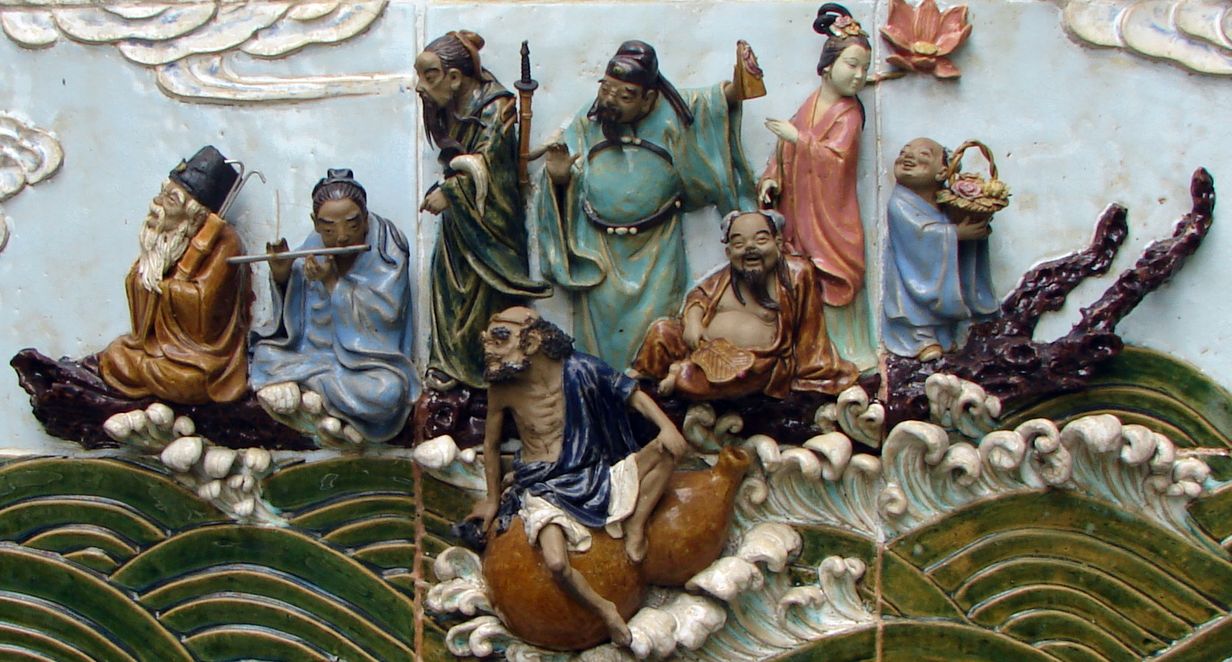
Content created: 2010-12-30
File last modified:
Go to previous story, quizzes.

CÁO Bīn 曹彬 = a high official and father of the empress
CÁO Guójiù 曹国舅 (= "Nation's Uncle Cáo") = Cáo Bīn’s older son, younger brother of the empress, and hence the nation's "uncle"; actually named CÁO Jǐngxiū 曹景休, sometimes called CÁO Yǒu 曹友 ("Cáo the Friendly"); very virtuous
CÁO Jǐngzhí 曹景植 (= CÁO Èr 曹二) = Cáo Bīn’s younger son, never called the nation's "uncle"; very evil
YUÁN Wénzhèng 袁文正 = (1) an imperial graduate; (2) his ghost
YUÁN’s wife, startlingly resilient
BĀO Zhěng 包拯 = an imperial censor and famous detective
Gold Flash of Tàibái Mountain (Tàibái Jīnxīng 太白金星) = a rather forceful immortal
LǙ Dòngbīn 吕洞宾 = an immortal (story 4)
ZHŌNGLÍ Quán 钟离权 = another one (story 3)

CÁO Bīn 曹彬 was a high official of the Sòng 宋 dynasty. Indeed, he was the father of the empress herself, the first wife of the Emperor Rénzōng 仁宗 (reign 15b-4).
In addition to being the father of the empress, Cáo Bīn had two sons, the younger brothers of the empress. The elder was named CÁO Jǐngxiū 曹景休 but was also called CÁO Yǒu 曹友, or “Cáo the Friendly.” Because he was a younger brother of the empress, he is known to history as CÁO Guójiù 曹国舅, which means “Cáo the Nation’s Uncle.” Cáo Guójiù was very virtuous, and was widely loved and admired.
The second brother was named CÁO Jǐngzhí 曹景植, but was usually called CÁO Èr 曹二, which simply meant “Second Cáo,” a name he never liked very well.
Second Cáo was the opposite of his virtuous older brother. Since Second Cáo was a younger brother of the empress herself, he was above the law and felt free to be as evil as he pleased, which was very evil indeed, for he seized people’s land and their money and even their daughters.
Second Cáo’s behavior was a matter of great distress for Cáo Guójiù, who admonished him over and over just as older brothers should do, but always with no effect. Second Cáo liked being evil, and he had no intention of giving it up.
Tradition tells us how things finally came to a head. It seems that an imperial graduate by the name of YUÁN Wénzhèng 袁文正, from the county of Cháoyáng 潮阳县 in the district of Cháozhōu 潮州府 in Guǎngdōng 广东 Province, was en route with his wife to the capital to take the next level of examination. And it also seems that his wife was remarkably beautiful, as successful young men’s wives tended to be. Unfortunately, she was spotted by Second Cáo, who desired her for himself. So he invited the young scholar and his beautiful wife to his palace, where he simply strangled the husband and tried to rape the wife. When she resisted, he had her thrown into a ghastly dungeon in the hope that she would be persuaded by the cold and the darkness and the hunger and the filth and the damp and the rats and the rot to change her mind.
He had not anticipated that the famous and righteous imperial censor, Lord BĀO Zhěng 包拯, would be involved in the case of the murdered Mr. Yuán, but that is what happened. Worse yet, the ghost of young Yuán appeared to Lord Bāo and told him what had happened.
Cáo Guójiù was horrified at his brother’s behavior, which had never extended to homicide before. And he knew that Imperial Censor Bāo would judge the case with no attention to the evil culprit’s imperial connections. Righteous judges, he knew, apply the law to prince and pauper alike, paying no heed to royal connections. So, although it made him sad to do so, he secretly advised his little brother that the only way to avoid conviction was by a further crime: he should kill the woman before she could testify.
Acting on this insight, Second Cáo had her released from the dungeon and thrown down a deep well.
Now people thrown down deep wells are expected to die. But in this case there was a burst of light and an old man appeared, who said he was the Gold Flash of Tàibái Mountain (Tàibái Jīngxīng 太白金星). He pulled her out of the well and helped her to escape. Stumbling along the road, she encountered a procession of none other than Lord Bāo. Storytellers agree that, in accord with ancient and honored custom, she knelt demurely beside his palanquin and pathetically cried out for justice. More likely she threw herself in the road and wailed and caterwauled, but it worked out the same way, and the lord in the palanquin stopped to hear her plea.
Unfortunately, he was not Lord Bāo. In fact, he was none other than Cáo Guójiù, the very man who had secretly advised his younger brother to have her thrown down the well. Cáo Guójiù was embarrassed and frightened. He could not refuse the plea of a commoner kneeling before the palanquin of a magistrate. But he definitely did not want to accept her complaint, and it was distinctly creepy that she was even still alive. So he yelled at her for blocking his way rather than kneeling respectfully beside the road as the well-bred murder victim ought to do, and he sent her off to be beaten to death with iron-spiked whips.
When she was dead, the mangled body was tossed into a dark ally.
But he had not realized what stern stuff she was made of. Some say she did not die. Some say she died but came back to life. Whatever happened, living or ghostly, she managed to inform the righteous Lord Bāo about the whole business. And Lord Bāo, being righteous, ordered the arrest of both brothers. In the court, Yuán’s widow (or her ghost) told all that had happened. And then, despite the calls for mercy from the empress and even from the emperor himself, Lord Bāo had Second Cáo beheaded, a fate which he had obviously deserved for a very long time.
For his role in the affair, Cáo Guójiù was held in prison, pending further investigation. Their majesties were more effective this time, and the emperor, at the incessant and rather annoying urging of his wife, declared a general amnesty. This set free all sorts of thieves and brigands and thugs and muggers, who were at liberty to prey upon the common people once again. But it also liberated her brother Cáo Guójiù, which was the point of the whole thing.

The virtuous Cáo Guójiù was very, very ashamed. He was ashamed of his terrible little brother, of course. He had always been ashamed of him. But he was also ashamed of himself for seeking to protect his brother, and for advising him to kill the Widow Yuán, and for having her beaten to death with iron-spiked whips and for having her body thrown down a well.
That was a great deal to be ashamed of, and indeed, he was so ashamed that he left civilization and hid in the mountains, where he determined to give up his life of luxury and to follow the ways of the mountain hermits and to learn about the properties of unusual plants and to seek the Way.
Unfortunately, although he understood the general principle of the thing, he wasn’t terribly good at the details. He barely found enough to eat, and he could not work out either how to do magic or even the most basic principles of alchemy. What was the good of being a hermit if you couldn’t make elixirs?
(Naturally there are people who cannot imagine that Cáo Guójiù could possibly ever have been so trecherous as to advise his evil little brother to kill anybody, especially as a cover-up. Instead, they tell us that he spent most of his money compensating his brother's victims, became more and more interested in studying the Way, and left for the mountains when the empress died, justice prevailed, and Second Cáo had been chopped to bits by the public executioner. Perhaps. But it is not as interesting that way.)
Now the seven immortals whose stories we have already learned all lived together in a group of romantic grottos in the sky, where they practiced the Way together, and from time to time made merry as well. But there was an eighth grotto which was still empty, and it was clearly the intention of Fate that their group should have one more member. As they cast about for an appropriate candidate, Cáo Guójiù came to their attention. It was true that he wasn’t very good at the arts that immortals must master, but he had become a committed recluse from the mundane world as well as a man of great native virtue, despite his extremely bad advice to his brother and all that had fallen out from that, about which he was at least penitant.
Therefore one day the two immortals ZHŌNGLÍ Quán 钟离权 and LǙ Dòngbīn 吕洞宾 whom we met in earlier stories visited him at his little hut and asked him what he was doing all alone in the mountains far from civilized society.
“I am seeking the Way,” he told them.
“And what way might that be?” they asked, “and where can it be found?”
Cáo Guójiù pointed his finger at the sky and looked at them in silence.
“And where is the sky?” asked one of them, tickled at the Daoist game of communicating in gestures and riddles.
Never missing a beat, Cáo Guójiù in silence pointed at his heart.
The visitors looked at each other and spoke: “The heart is the sky. The sky is the Way. And you understand the origin of all things.” (To posterity this never made much sense, but posterity was not made up of immortals. Or anyway mostly not.)

With this they knew for sure that he was a person worthy to occupy the eighth heavenly grotto, and they set about to teach him the secrets of alchemy and the mysteries of the Way, all of which he learned in a startlingly short time.
In art Cáo Guójiù is usually represented in full court regalia, with his official robes and hat, and carrying the tablet that officials always held when they respectfully attended upon the emperor. Sometimes he carries, not a genteel and courtly tablet, but theatrical bamboo castanets, by which a person can make a good deal more noise. Because of this, he is a patron god of actors.

Return to top
Go to
previous story, quizzes